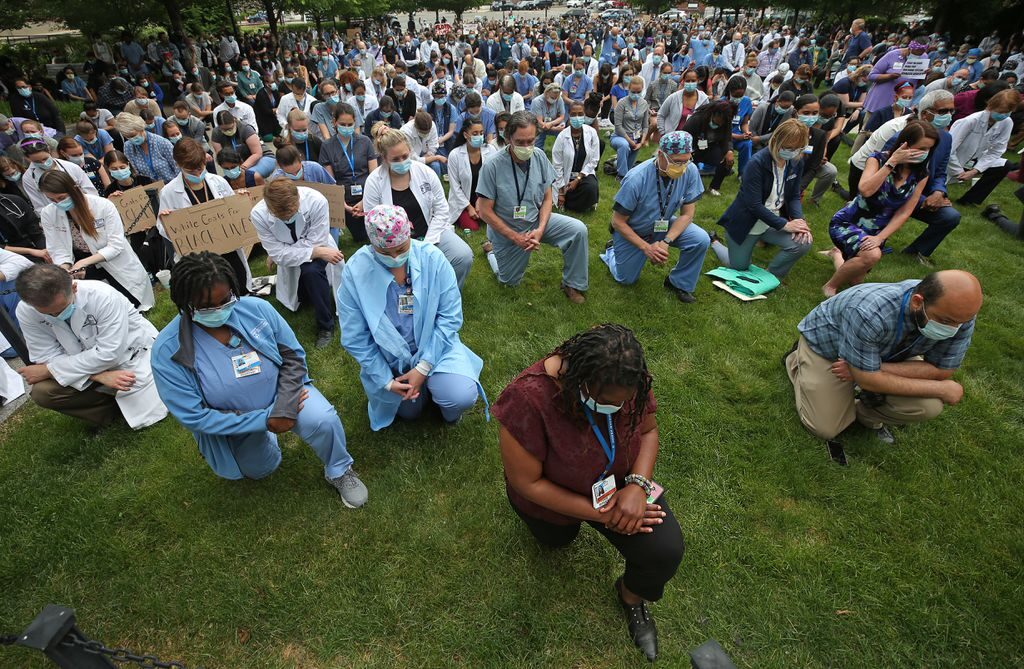Beth Israel Lahey Health community members joined health care workers across Massachusetts in solidarity with Black Americans, saying racism is a public health crisis and that the state’s world-renowned hospitals should do more to address it.
Boston Globe – June 5, 2020

Boston medical community steps up for racial justice
Medical professionals around Boston on Friday rallied against police brutality and in solidarity with Black Americans, saying racism is a public health crisis and that the city’s world-renowned hospitals should do more to address it.
At noon, several hundred people affiliated with Brigham and Women’s Hospital — many wearing scrubs or white coats — gathered in Stoneman Centennial Park for a vigil organized by first-year internal medicine residents.
The crowd knelt silently for 8 minutes and 46 seconds, the amount of time former Minneapolis police officer Derek Chauvin kept his knee on George Floyd’s neck, killing him. Some held their fists in the air, while others held signs saying “injustice anywhere is a threat to justice everywhere.”
Brigham and Women’s “is a pretty large organization and has a lot of power and pull,” said internal medicine resident Cheikh Njie.
“The crisis happening on Black lives right now is actually a public health crisis, which means it is our responsibility to make sure we are not only talking about it but addressing it,” Njie said.Get Today’s Headlines in your inboxThe day’s top stories delivered every morning.
Several residents called on the hospital to hire more Black physicians, staff, and faculty, make the hospital safer for the Black community, eliminate health insurance-related barriers that may prevent communities of color from accessing medical care, and publish annual data on the number of Black faculty employed by the hospital. Brigham and Women’s staffers loudly cheered the proposals.
Narcissa Plummer, a Black lab technician at the hospital, said it was heartening to see the show of support from a diverse group of colleagues.

“As an African American, we’re going through troubling times, and it’s nice to know your place of work is there to support you,” Plummer said in an interview. “To see the people that come out — your co-workers, your friends — to see how they support you is a nice feeling.”
Plummer, who also works at Tufts Medical Center, said hospitals have long strived to treat all patients with respect, regardless of race. But now, she said, it’s time for health care leaders to extend that commitment beyond the halls of their facilities and advocate against racism more broadly.
“It’s very important for the hospitals who are serving the community to actually say, ‘We’re here for you, not just in medicine, but as community leaders,’ ” she said.
Brigham’s president, Dr. Betsy Nabel, expressed solidarity with the group gathered for the vigil.
“No one should live in fear of receiving inequitable health care because of the color of their skin, their gender identity, their native language, their religion, or where they live,” Nabel told the group. “This is a time when we will and we must look inside our own hearts to understand how we are responsible for complicity and structural racism.”
Younger medical residents have emerged as a driving force behind renewed efforts to make health care more equitable, as protests over systemic racism and violent policing rock the country.
More than 7,000 medical trainees around the country have signed on to an effort by a group called Medical Students Mobilizing. The group is demanding sweeping reforms to police practices, including establishing a federal database of officers accused of violence and misconduct that prevents them from being rehired by other jurisdictions.
Along with doctors and other medical workers, the students are also calling attention to vast racial disparities in health care outcomes that mirror other measures of racial inequity in the United States.
In Boston, for example, Black residents account for 38 percent of coronavirus cases in which racial data is known, despite comprising just 25 percent of the city’s population. As the death rate increased across the state in early April, it surged nearly 40 percent higher in cities and towns with the largest concentrations of people of color, compared to those with the least, the Globe reported.
Shortly after the Brigham and Women’s event, about 200 workers from nearby Beth Israel Deaconess Medical Center also rallied for racial justice at a demonstration organized by the hospital’s department of medicine.
As at Brigham and Women’s, the Beth Israel group knelt silently for eight minutes, 46 seconds. Many attendees — sporting scrubs and white coats — held signs honoring George Floyd, Breonna Taylor, and others killed by police officers. Workers who could not attend the event in person joined via Zoom and used the hashtag #whitecoats4blacklives on social media to show solidarity with the cause.
Nhi Vo, a resident in Beth Israel’s radiology department, said she believes standing up for racial justice is an obligation for health professionals who care about the overall well-being of their communities.
“We know that there’s a lot of health care disparity in America, so showing that the hospital system supports and is behind the Black Lives Matter movement shows that we’re welcoming of everyone,” she said, “particularly those who are marginalized and underrepresented.”

